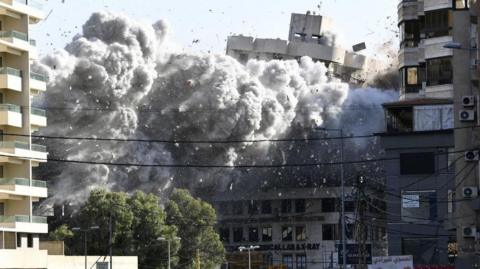The streets were dark and cars packed. People, who moved on foot, carried bags with their belongings, unsure about where they were going but certain that they could not stay.
This was the scene on Tuesday in Nuweiri, central Beirut, moments after the Israeli military issued evacuation warnings, the first for these areas.
We were trying to visit the site of an Israeli air strike hours earlier, in the afternoon, that came without warning, flattened one building and killed at least seven people. But we could not get there.
Crowds were leaving, and men on motorbikes stopped us from moving, saying it was not safe.
Minutes later, we heard several explosions, from more attacks. And for hours, that was how the night unfolded in Beirut. Multiple blasts. Some in the distance; others closer.
Gunshots announced more warnings, urging people to seek safety. All of this, with the constant sound of an Israeli drone flying overhead.
This dramatic escalation came as the country waited for an Israeli decision on a ceasefire deal, the main hope to end over a year of conflict with Hezbollah, the powerful Iranian-backed movement.
During that wait, Israel unleashed its most intense bombardment of Beirut in the conflict.
Within two minutes, shortly after the attack on Nuweiri, fighter jets hit 20 targets in the city’s southern suburbs, known as Dahieh, where Hezbollah is based in the city.
The Israel Defense Forces (IDF) said the targets hit were facilities used by Hezbollah, and the wave of attacks was heard across the city.
